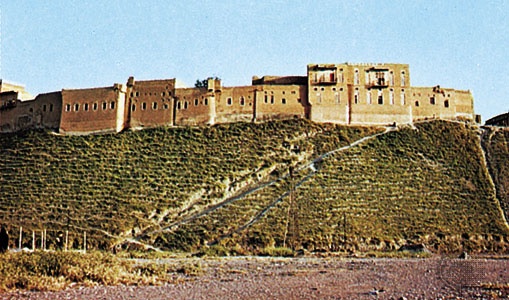Irbīl
ancient city, Iraq
also spelled Arbil or Erbil, Assyrian Arba-ilu, Greek Arbela
 ancient town, northern Iraq. It is situated 48 miles (77 km) east of Mosul in the foothills of the mountains that rise to the east. It is a trade centre for agricultural produce. A rail terminus, it is also linked by roads to Turkey, Syria, and Iran.
ancient town, northern Iraq. It is situated 48 miles (77 km) east of Mosul in the foothills of the mountains that rise to the east. It is a trade centre for agricultural produce. A rail terminus, it is also linked by roads to Turkey, Syria, and Iran.Irbīl is one of the oldest continuously inhabited towns in the world. The modern town occupies the top of the tell (mound formed by successive building over a long period of time), rising about 100 feet (30 metres) above the level of the plain. The town was mentioned in the late 3rd-millennium-BC correspondence of Shulgi, king of Ur, as Urbillum, and later it was known as Arba-ilu by the Assyrians. It was a centre of communication in the Assyrian empire and long remained a crossroads of caravan routes. In the Battle of Gaugamela (Gaugamela, Battle of), also known as the Battle of Arbela, fought near the town in 331 BC, Alexander the Great decisively defeated Darius III, opening the way for his conquest of Persia. The town became Christian at an early date, and, later (AD 340), Christians were persecuted there. The Muslim conquest in the 7th century did not prevent Irbīl from remaining an active centre of Christianity and the seat of a bishopric. Muẓaffar al-Dīn, brother-in-law of Saladin, made Irbīl his capital from 1190 until 1232 and constructed several buildings that can still be seen at the foot of the upper town. Irbīl lost its major importance to Mosul in the 13th century but remained a leading town in the region. The population is still a mixture of Christians and Sunnite Muslim Kurds. The University of Ṣalāḥ al-Dīn in Irbīl was founded in 1968; there is also a technical institute (founded 1976) devoted to agriculture. The crops grown in the surrounding area include sesame, corn (maize), millet, and fruit. Pop. (2003 est.) 1,100,000.
- Lee, Arthur
- Lee Bontecou
- Lee Calhoun
- leech
- leeching
- Leech, John
- Lee Commission
- Lee, David M.
- Lee De Forest
- Leeds
- Leeds, Thomas Osborne, 1st Duke of, Marquess of Carmarthen, Earl of Danby, Viscount Latimer of Danby, Viscount Osborne of Dunblane, Baron Osborne of Kiveton
- LEED® standards
- Lee-Enfield rifle
- Lee Evans
- Lee, Gypsy Rose
- Lee, Harper
- Lee Harvey Oswald
- Lee, Henry
- Lee Iacocca
- Lee, Ivy Ledbetter
- Lee, Jennie, Baroness of Asheridge
- Lee, John Clifford Hodges
- leek
- Lee Konitz
- Lee Krasner